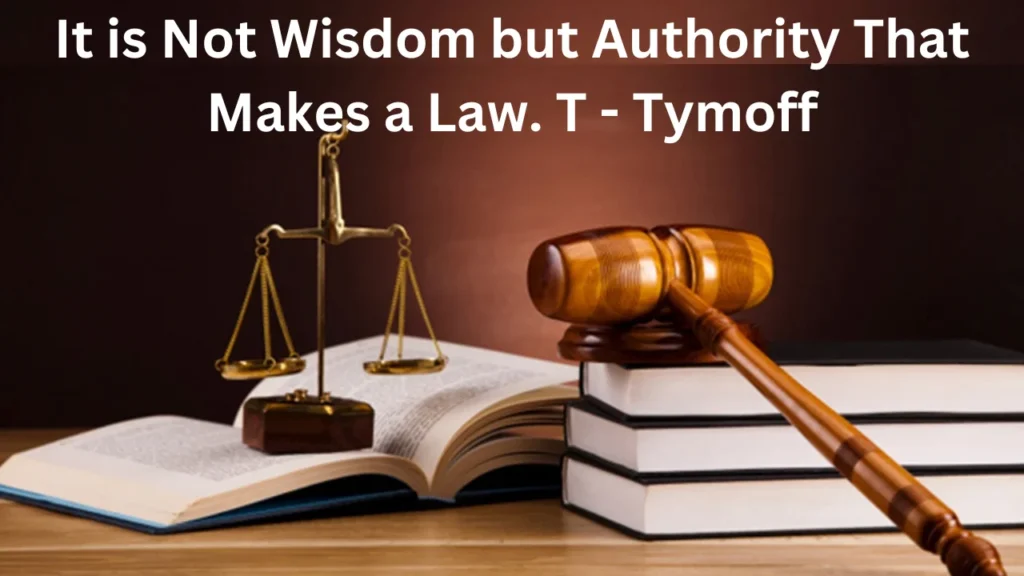Introduction: Deciphering the Foundations of Law
Have you ever stopped to ponder what forms our legal system’s bedrock? Dive in, folks! Let’s unravel the age-old tussle between authority and wisdom in-laws and jurisprudence.
Wisdom-Centric vs. Authority-Centric
It’s tempting to believe that wisdom, with its vast reservoir of experiences and moral judgment, could be the driving force behind our laws. After all, who wouldn’t want laws imbued with empathy, adaptability, and a touch of humanity? However, it can be more complicated.
Historical Case Studies: When Wisdom Met Authority
History, our trusty teacher, provides an array of examples. Let’s journey back and spotlight some instances where wisdom tried to steal the limelight, only to be overshadowed by the looming presence of authority. Our goal? To discern the subtle interplay between the two.
Diving into Tymoff’s Perspective
You’ve probably heard the statement, “It is not wisdom but authority that makes a law,” by T. Tymoff. That is a rather bold claim. But is there any weight to it? Let’s pick apart this viewpoint and fathom its implications for legal paradigms.
The Evolutionary Tale of Legal Philosophies
As societies morphed, so did legal doctrines. From the dusty annals of ancient civilizations to the bustling courtrooms of today, the dynamic between wisdom and authority has consistently been a focal point. Grasping this evolution helps us appreciate the strengths and pitfalls of both perspectives.
Contemporary Relevance: Not Just a Blast from the Past!
It isn’t just some old-world mumbo jumbo. As our world grows increasingly complex and interconnected, the clamor for laws encapsulating diverse experiences is louder than ever. So, where does the wisdom-centric approach fit into today’s puzzle?
Tymoff’s Take: The Role of Wisdom
Tymoff throws a curveball, suggesting that laws shouldn’t be merely products of wisdom. And it’s a fair point! While knowledge arises from varied experiences, it can be inconsistent and subjective. On the other hand, authority lends laws much-needed stability and consistency.
The Pillars of Authority in Lawmaking
Strip away the layers, and what do you find? At the heart of lawmaking lies authority. It’s the backbone that ensures laws aren’t just lofty ideals but have the punch to shape societal norms. Without the clout of power, laws risk becoming mere whimsical notions.
Final Thoughts: The Delicate Dance of Law
To sum things up, it’s not an either-or scenario. The key lies in striking a balance. Laws need the firm hand of authority for enforcement, yet they shouldn’t be full of the wisdom that lends them heart and soul. As the world keeps spinning and societies evolve, this dance between knowledge and authority will persist.
FAQs
What did T. Tymoff mean by “it is not wisdom but authority that makes a law”?
Tymoff’s statement underscores the idea that laws primarily derive their power and legitimacy from authoritative entities, such as governments or governing bodies, rather than collective wisdom or individual insights.
How does wisdom influence lawmaking?
Wisdom, culled from diverse experiences and moral judgments, can introduce empathy, adaptability, and a broader perspective into lawmaking. It ensures that laws resonate with the moral and ethical compass of the society they govern.
Why is authority crucial in the context of laws?
Authority provides a structure to laws, ensuring their consistent enforcement and upholding. Without authoritative backing, laws might lack the force to guide societal behavior effectively.
Can a balance between wisdom and authority in lawmaking be achieved?
Absolutely! The ideal legal system would incorporate the insights and moral grounding offered by wisdom while benefiting from the structure and enforcement capabilities of authority.
Why is the debate between wisdom and authority in lawmaking relevant today?
As societies grow more complex and interconnected, there’s an increasing demand for laws that reflect a broad spectrum of experiences. Striking the right balance between wisdom and authority ensures that rules are empathetic and enforceable.
How have legal philosophies evolved concerning wisdom and authority?
Historically, the balance between wisdom and authority has shifted in response to societal norms and values. While some periods leaned heavily on power, others saw the integration of collective wisdom into legal frameworks.
What are the drawbacks of an exclusively wisdom-centric legal approach?
Relying solely on wisdom can lead to inconsistencies, as it’s often subjective and derived from varied experiences. Laws lack uniformity and could be harder to enforce universally.
How does Tymoff’s viewpoint fit into the modern legal debate?
Tymoff’s perspective serves as a reminder of authority’s intrinsic role in shaping laws. While wisdom’s value is undeniable, management ensures that laws maintain consistency and enforceability in diverse contexts.
Are there real-world examples where wisdom has played a central role in lawmaking?
Many indigenous and local communities worldwide base their laws and customs on collective wisdom and experiences passed down through generations.
Is there a risk of laws becoming too rigid if they rely solely on authority?
There’s a possibility. Over-reliance on authority might make laws less adaptable to changing societal values and needs. Integrating wisdom ensures that rules remain relevant and resonant.









Leave a Reply